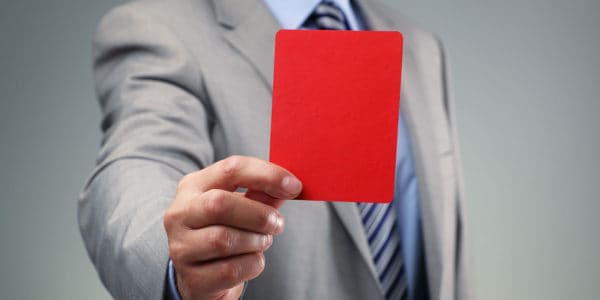Director disqualification can occur if a company director does not meet the legal responsibilities of their role, whether as a result of trading fraudulently, failing to submit annual accounts, or not paying tax owed by the company.
Being disqualified means that an individual cannot be the director of any company in the UK, or any foreign companies operating in the UK for a fixed period of time. Such restrictions can have serious long-term repercussions and can potentially damage your career and reputation. Therefore, it’s worth understanding exactly what director disqualification means and how it could affect you.
Disqualification of a director occurs most commonly when a company is continuing to trade whilst going into insolvency. In a smaller number of cases, however, directors are disqualified as a result of knowingly engaging in criminal behaviour.
A director disqualification can last anywhere between two and fifteen years. It not only bans you from managing or setting up a company, but also from taking on other positions of trust.
Government legislation means that it can also be costly to you on an individual level. If your company has gone into liquidation and has debts that need to be paid off, then you might also find yourself personally financially liable for those debts.
What is director disqualification and who governs it?
Director disqualification means that you cannot act as a director or manage a company for the duration of your disqualification period. In addition, you cannot continue to act in the role of a director, even if you are not officially named as a director. The Company Director Disqualification Act 1986 (CDDA) is the principal piece of government legislation that governs disqualifications.
The vast majority of director disqualification cases are due to company insolvency. If your company is reported to the Insolvency Service, they may open an investigation into either your company in general or you as its director. If they conclude you have neglected your legal responsibilities, they may apply to the courts to have you disqualified.
Other organisations and bodies which may investigate your conduct include Companies House, the Competition and Markets Authority (CMA), the courts or a company insolvency practitioner.
You can be disqualified from acting as a company director if you fail to meet the legal responsibilities of the role. Anyone can report a company director for being ‘unfit’ by using the Complain about a limited company feature on the Gov.uk website.
Examples of unfit conduct include:
- Failing to file a confirmation statement or annual accounts
- Keeping improper accounting records or filing inaccurate accounts to Companies House
- Failing to pay any tax owed by the company
- Using the company’s assets for personal gain
- Failing to respond to any liquidator requests
- Allowing a company to keep trading when it is insolvent
In October 2016, new legislation came into force by way of the Small Business, Enterprise and Employment Act 2015, which meant that directors who have been disqualified can now also be held personally liable for their company’s debts and money owed to HMRC. In addition to disqualification, those who are barred from directorships can be left with extremely expensive bills to pay.
The financial and professional costs of director disqualification can therefore be very steep, but so too is the reputational damage that can be done by being publicly named as a disqualified director.
All directors who have been disqualified are publicly listed on a Companies House directory and are listed for three months on the Insolvency Service’s Register. These databases can be searched by anyone, and anyone can report a director to these bodies if they suspect a director has breached the terms of their disqualification.
Consequences of director disqualification
If you are disqualified as a director, you are prohibited from acting as a director for up to a maximum of fifteen years. You will have to step down from the management of your present company, and you will be barred from taking up the directorship of another UK company, becoming a partner in a UK limited partnership, or from becoming a director of an overseas company that has dealings in the UK.
You will also be banned from forming, running or marketing a new company in any way, including ordering another individual to act on your behalf in managing a company.
Other restrictions also apply during your period of disqualification, and a ban can prevent you from taking up other positions of trust. This means you cannot sit on the board of a school, charity or police authority, or act as a pension trustee. You also cannot be registered as a social landlord, sit on a health or social care board and you may not be able to practice as a solicitor, barrister or accountant.
Breaching any of these disqualifications means you run the risk of a heavy fine or being sent to prison for up to two years.
What’s a disqualification undertaking?
Where the Insolvency Service has investigated you and decided to apply to the court for a director disqualification, they will notify you of their intention. You are then given the opportunity to enter into a disqualification undertaking, which means you can agree to disqualify yourself on a voluntary basis, thus avoiding having to go to court.
The benefit of a disqualification undertaking is that it can lead to more lenient disqualification periods, lower fines, and lower compensation requests. Whether you agree to a disqualification undertaking or defend your case in court, it is important that you seek good legal advice.
Can you appeal your disqualification?
It is possible to appeal your director disqualification, whether you were disqualified by the courts or voluntarily through a disqualification undertaking. However, it is not possible to reduce the length of your disqualification below the minimum of two years.
If you need to act as a director of a company during your disqualification period, you can apply to the court for special permission to allow you to do so in exceptional circumstances.
How long does disqualification last?
The length of your disqualification will very much depend on the gravity of the offence and the individual facts of your case. Director disqualification generally falls into one of three bands.
For lower category offences, a disqualification will normally last between two and five years. Lower category offences may include things such as negligent or reckless conduct, usually categorised as a failure of judgment rather than an act carried out with criminal or malicious intent.
Mid-tier offences usually receive a disqualification of between six and ten years. Offences in this bracket are more serious, possibly endangering the public interest.
The most serious offences can lead to a ban of up to fifteen years. These cases are generally related to fraud, embezzlement or serious criminal behaviour, carried out knowingly and for personal gain.
Can it affect you once your disqualification period comes to an end?
Once you reach the end of your disqualification period, your name and details will automatically be removed from the Companies House register. The Insolvency Service’s register of disqualified directors only lists those who have been disqualified in the past three months, so your details will be removed once that time has elapsed.
Once your details have been removed from both registers, people cannot search out details of your disqualification through these channels. However, in a digital age, people may still be able to search for details which are elsewhere in the public record, such as online newspaper archives.
Will it affect your credit rating?
It is possible that your director disqualification may impact your credit rating. The passing of the Small Business, Enterprise and Employment Act in 2015 gave courts the power to apply for compensation orders against directors who had been disqualified for unlawful or wrongful trading.
Previously, this action had to be undertaken separately. The Secretary of State has two years from the start of your disqualification to start compensation proceedings against you.
Furthermore, insolvent companies can now impact the directors. If you have not carried out your legal duties in accordance with the Companies Act 2006 and the Insolvency Act 1986, you can be held personally responsible for paying off your company’s debts.
If this happens, you will effectively take on the debt for your company, and that, in turn, will negatively affect your credit rating, since it then becomes a personal debt. It is worth seeking legal advice when deciding whether or not to contest a compensation claim.
Who can report a disqualified director who is still practising?
Anyone is able to report a disqualified director who is still in a director role or has tried to set up and manage a new company. If a disqualified director is ‘managing from behind the scenes’ and using someone else to carry out their work, then both can be prosecuted and face either a fine or a prison sentence of up to two years.
Anyone who suspects a disqualified individual of breaking the terms of their ban can report it directly to Companies House or the Insolvency Service. You can report a director simply by logging on to report a disqualified director and filling out the form.
Please note that the information provided in this article is for general informational purposes only and does not constitute legal, tax, or professional advice. While our aim is that the content is accurate and up to date, it should not be relied upon as a substitute for tailored advice from qualified professionals. We strongly recommend that you seek independent legal and tax advice specific to your circumstances before acting on any information contained in this article. We accept no responsibility or liability for any loss or damage that may result from your reliance on the information provided in this article. Use of the information contained in this article is entirely at your own risk.






Join The Discussion